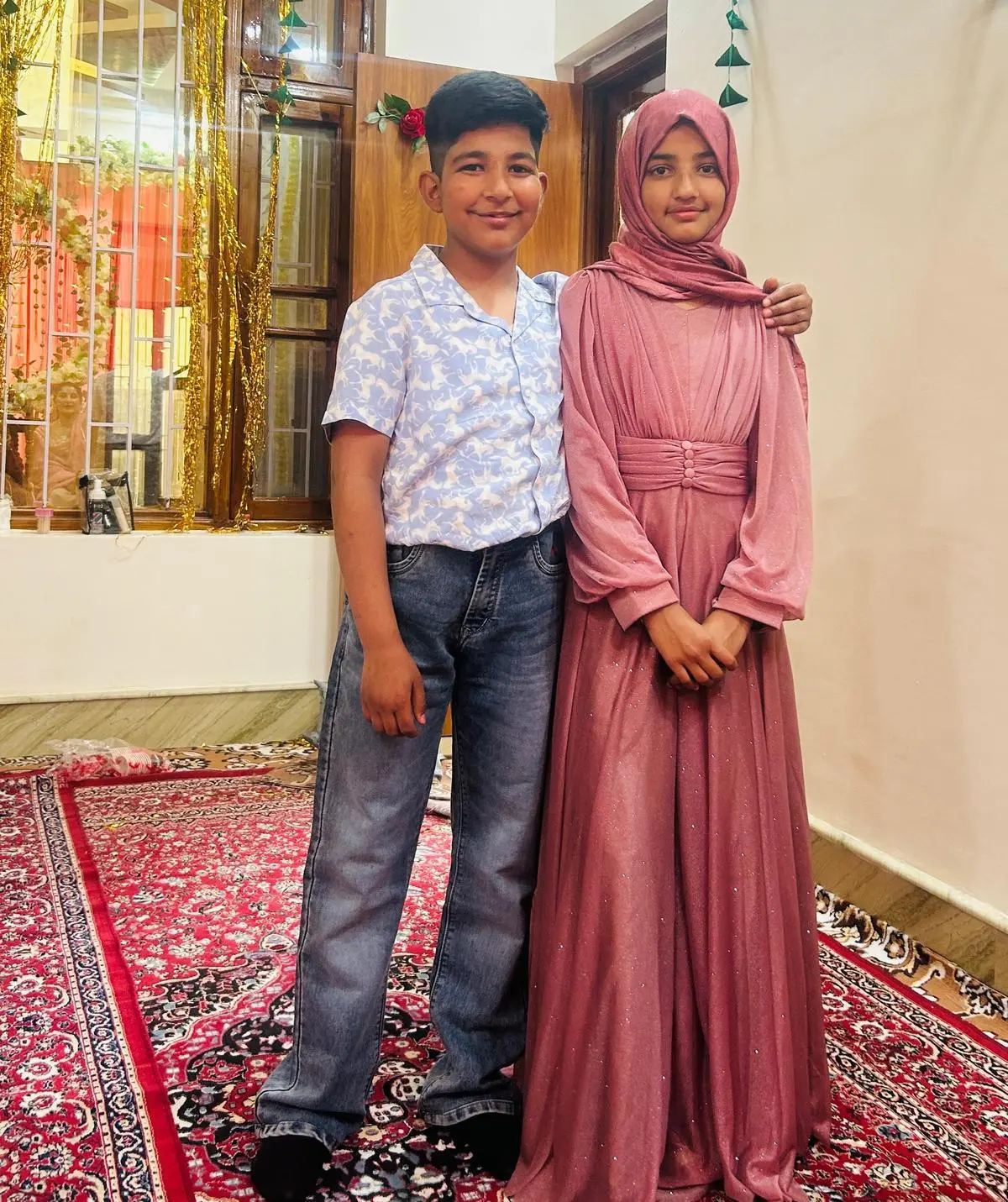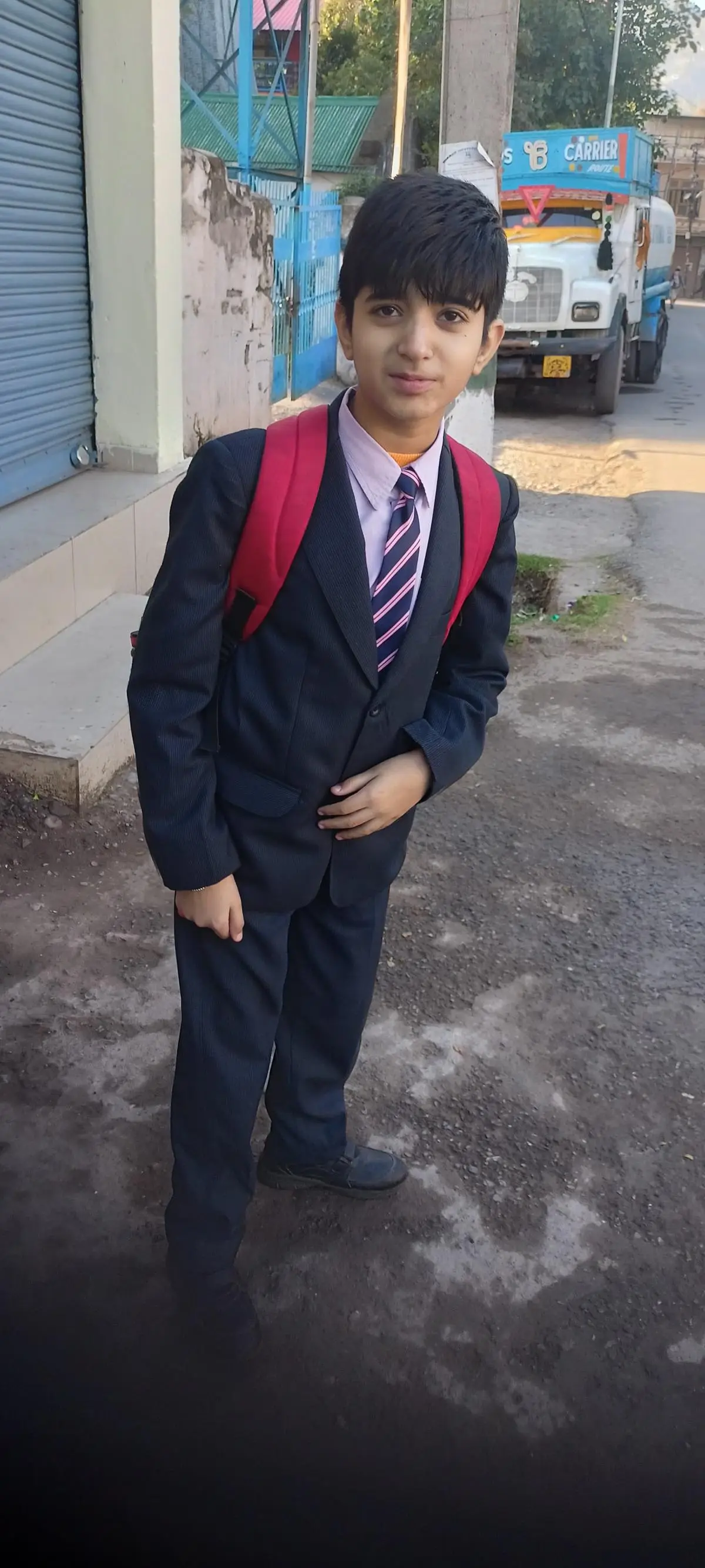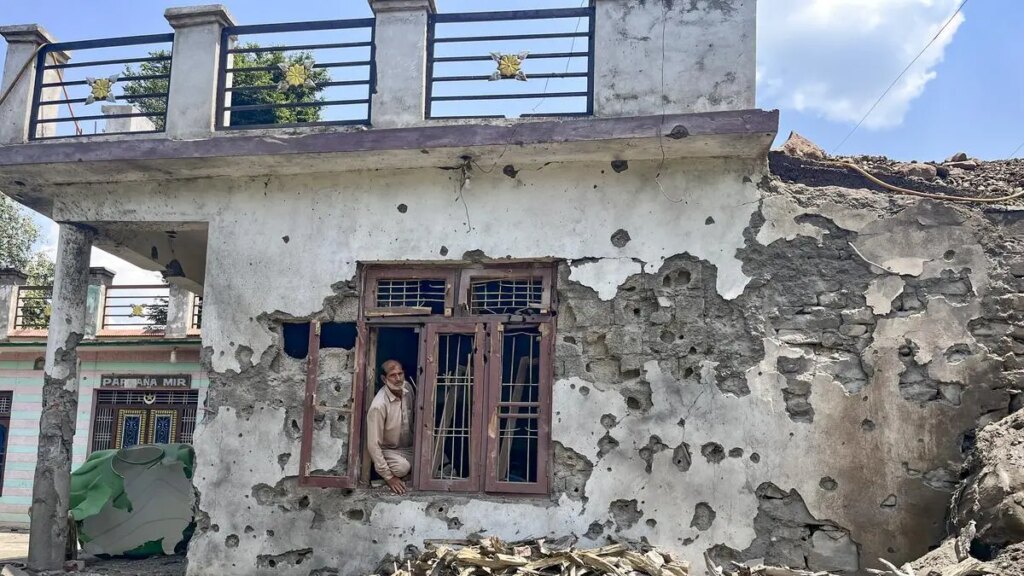Each time Rameez Khan (42) asked about their twins, his wife, Arusha Khan (33), muffles her face with a scarf, struggling to fight back tears. “They are both fine,” she said.
For all 11 days that Rameez was admitted inside the ICU of Government Medical College (GMC) in Jammu, Arusha had hid from him that their children—the 12 year old twins Zain Ali and Urwa Fatima—were no more.
Both children are among the 15 casualties resulting from the clashes between India and Pakistan along the border district of Poonch, perched on the undulating Pir Panjal mountain ranges that extend into the Pakistani side across the Line of Control (LoC).
As both India and Pakistan faced off against each other recently in the aftermath of the deadly militant attack in Pahalgam, Poonch suffered heavy losses on account of the cross-border shelling. While the aerial skirmishes—the drone swarms and the fusillade of missiles that both countries hurtled into each other’s territories—received the most coverage in the press, what came to be overlooked was the intense bombardment in areas such as Poonch, resulting from the two militaries shelling each other on scale not witnessed in Jammu and Kashmir since the 1999 Kargil War.
The night of horror
On the night of May 7, Rameez and Arusha were put up inside their rented home in Poonch town amid heavy shelling. All they could hear was intense thuds rattling the entire neighbourhoods as munitions came raining down from across the mountains, long hissing voices that ended with explosions.
Amid panic, Arusha made a phone call to her brother Aadil Pathan in Surankote, 39 km away, to inform him about the dire situation building up around them. “The kids also spoke to their uncle and requested him to take them to Surankote,” said Maria Pathan, Arusha’s sister, who spoke to Frontline over the phone. “My brother left at 5:30 in the morning. It takes around one hour to reach Poonch from Surankote.”
Also Read | The LoC is calm again, but Kashmiris still live under the shadow of war
Upon reaching the location, Aadil stood at the other end of the lane, and called for the family. No sooner the family came out and dashed towards the vehicle than a shell dropped behind them, with hundreds of splinters bursting out in all directions. All except Arusha fell down, wounded severely by the metal shrapnel.
“In the melee, Arusha noticed that Urwa was bleeding. She had died on the spot,” Maria said, sobbing. “Zain was nowhere to be seen immediately. Arusha looked out for him and realised that he had staggered into someone’s home nearby. He didn’t survive either.”
Rameez had suffered serious shrapnel injuries to his liver, ribcage, and back. It was Aadil who loaded Rameez’s lifeless body onto his back and eased him into the backseat of his car, driving him all the way to the District Hospital in Poonch. “He had had significant blood loss,” Maria said. “Doctors transfused him with several pints of blood before he was shifted to GMC Jammu.”

Zain Ali and Urwa Fatima, the 12-year-old twins from Poonch. Both children are among the 15 casualties resulting from the clashes between India and Pakistan along the border district.
| Photo Credit:
By Special Arrangement
As he was battling for his life, Rameez was kept in the dark about his children’s fate. “My sister thought she would lose her husband too,” Maria said. “So she didn’t tell him anything about the kids. She has been courageous beyond imagination.”
Burying her children without her husband’s knowledge was the toughest decision she had to undertake. Her family drove the bodies to their ancestral village in Chandak, 4 km from Poonch town, where their last rites were conducted.
On May 25, a video went viral all over social media in Jammu and Kashmir, showing Arusha breaking down inconsolably as Rameez lay on a hospital bed, awakened but not yet fully recovered. “I couldn’t even cry all these days,” she wails, breaking the news of their children’s demise to her husband, who was seen wiping tears from his face.
The embattled school in the highlands
The kids were studying at Christ School in Poonch, a hulking structure of yellow and beige colours girdled by the Pir Panjal hills. Maria said the reasons for the family for relocating to Poonch from Chandak was to ensure the children could run a hassle-free commute back and forth between the school and home.
The school itself had also come under the barrage of projectiles during the four days of intense shelling and suffered significant damage. “We recovered three and a half kg of shrapnel from the school premises,” Father Shijo Kanjirathingal, the principal at Christ School, tells Frontline. “A lot of families living in neighbourhoods close to the school had also taken shelter here.”
On May 19, the school reopened for the first time since the deadly shelling. At least one more student from the school had died in the shelling. His name is Vihaan Bhargav (13), a class VIII student.
“A total of five children have died on account of the cross-border shelling in Jammu and Kashmir.”
Vihaan’s case is even more gruesome. On May 7, when the shelling rocked Poonch, videos began to circulate online showing the severity of casualties. One clip that sent shock waves across Jammu and Kashmir was that of a young boy with his skull cracked open. It showed his body swinging as it was being lifted into the car by two people. Another clip showed a turbaned young boy inside the car, his arms ripped clean off at the joints, his bones torn apart.
Both the victims have now been identified as Vihaan, who died as an exploding shell blasted his skull, and his cousin, Rajvansh Singh, who is currently being treated at the Amandeep Medicity Hospital in Amritsar.
“For the entire night before the eventful day, he was shivering and vomiting,” Sanjeev Bhargav (45), Vihaan’s father, told Frontline. “Every time news played on TV that India had hit Pakistan with missiles, he cheered on. It buoyed his spirits.”
In the morning, however, Sanjeev realised that almost the entire neighbourhood in Poonch town was emptying of its residents, who were fleeing for safety.
“My brother called me from Jammu, insisting I must come too,” he said. “Also, what created apprehensions in me was the presence of a Bofors artillery gun nearby, which could have come under Pakistani attack, hurting others.”
Yet Sanjeev, who is a teacher at a government-run primary school in Poonch, was reluctant to flee from the town, until he saw shrapnel outside his gates the following morning. “My brother-in-law immediately brought the vehicle and my sister, her son [Rajvansh], my wife and Vihaan, too, hopped in,” he said.
The car had barely travelled 6 km from Poonch and reached Khanetar, a stop-over town of restaurants and hotels overhung with large billboards where an asphalt road zips a winding path round and round the mountains, when a shell struck it out of nowhere.
“We all passed out,” Sanjeev recalls. “I don’t remember anything about what happened at that moment. We only later realised that my son had died a brutal death, and the rest of my family members were grievously wounded.”
The communal bond in Poonch
As their only child, Sanjeev and his wife, Rashmi Sudhan, had hoped to see Vihaan become a civil servant one day. Rashmi, a Hindu, teaches at an Islamic seminary, Jamia Zia-ul-Uloom, in Poonch. “My son. My sweetheart son,” Sanjeev cried, wiping off tears. “He wouldn’t do anything without papa. He was a very bright kid.”
Sanjeev said that he was overwhelmed by the outpouring of grief for his son across the Union Territory. “People across the religious divide—Hindus and Muslims both—have mourned Vihaan,” he said.

Vihaan Bhargav (13), who died on May 8 after intense shelling from the Pakistani side. Pictures show Vihaan as an affable young boy in a school uniform posing for the camera, his face askew with a half-smile, his combed-down hair nearly touching his eyebrows.
| Photo Credit:
By Special Arrangement
Pictures show Vihaan as an affable young boy in a school uniform posing for the camera, his face askew with a half-smile, his combed-down hair nearly touching his eyebrows. Vihaan’s teachers describe him as a creative student who took a keen interest in the arts and crafts. “Everyone in his class adored him,” said Gaurav Kumar, a teacher at Christ School. “The children aren’t able to come to terms with this tragedy.”
A commemorative gathering was held in the memory of slain students, which was high on emotion as students downed their heads in grief. “There are still reeling under trauma,” Kanjirathingal said. “It will take some time for them to heal.”
On May 24, Congress MP and Leader of the Opposition in the Lok Sabha Rahul Gandhi made his second visit to Poonch since the Pahalgam attack. He also spoke to students at Christ School. “Your way of responding to this problem should be that you study really hard, you play really hard, and you make a lot of friends in school,” he said, throwing his arm around the shoulder of one of the pupils. “You lost your little friends. I am really sorry about that.”
A total of five children have died on account of the cross-border shelling in Jammu and Kashmir. Two-year-old Aisha Noor died as an industrial cluster was hit in the neighbouring Rajouri district, where she was living with her parents. The family hails from Bihar.
‘No orders for the evacuations’
At Sukha Katha in Poonch, a mountainside cluster of small homes stuccoed in beige colour, with a maze of cobbled alleys criss-crossing between them, Javaid Iqbal (35) has not been able to sleep since his five-year-old daughter, Maryam, died in front of his eyes. He cannot forget, he said, how the shrapnel stabbed her body, her blood pooling on the ground beneath her.
On May 7, Iqbal was huddled with seven other family members; his wife, three daughters, two sons of his brother, and one boy from the neighbourhood, inside a shed built next to his house. The shed was made of corrugated iron sheets and cinder blocks, and as such doubled up as a bunker in trying times like these.
“Shelling started at night and kept getting closer. We were up the entire time and children were muttering prayers,” Iqbal told Frontline.
At 10:30 am in the morning, a shell landed straight on the house, blasting away the structure and killing Maryam. “Everyone cried aloud. I tried calling a couple of acquaintances for help. An ambulance tried to make many attempts to come but failed as the shelling grew intense.”
Iqbal is originally from Qasba, a village close to cedar-covered hills surrounding the LoC in Poonch. The family had resettled in Sukha Katha five years ago on account of frequent cross-border flare-ups in the past. But now, the shells found their way to them too, uprooting the sense of calm in their modest lives.
“It was to escape the shelling between India and Pakistan that we shifted to another place,” said Iqbal, adding that he worked as a labourer for two years in Saudi Arabia so that he could put together enough resources to build a home in Sukha Katha.
Now that house lies in tatters. “I want my daughter back,” Iqbal, cries, looking at her picture on the phone. The shell explosion also injured his second daughter Iram Naaz (7) in the head. But she survived and is recovering at their ancestral home in Qasba.
Villagers in Sukha Katha are angry with the administration for not warning them in advance about the clashes. “The government didn’t tell us about this. Instead, all we were informed about was mock drills,” said Muhammad Mukhtar (35), a resident. “There was no word about the evacuations.”
Also Read | Fragile peace, persistent tensions, and the limits of diplomacy
Frontline called District Magistrate, Poonch, for comment but there was no response. Indeed, the administration itself was taken aback by the intensity of the attacks and the grim ways in which the situation escalated during the four days of shelling. Among the dead in the Pir Panjal region was Additional Deputy Commissioner of Rajouri, Raj Kumar Thapa, who died after a shell struck his residence, critically injuring two of his staff members.
Mukhtar, meanwhile, said that they wanted a permanent end to the war. “Both countries should talk and resolve their issues,” he said. “We cannot live the life of uncertainty forever like this.”
Iqbal told Frontline that it was one thing for people living miles away to cheer for war that did not directly affect them but totally different for people, such as those living in the frontier districts like Poonch, who have paid dearly each time there were military clashes between India and Pakistan.
“My grandfather used to tell me that he remembers the three wars (1947, 1965, and 1971) that India and Pakistan have fought,” he said. “But on each of these occasions, people in Poonch were first asked to evacuate. This time, strangely, no such thing happened. We don’t want this to happen to us ever again.”
Source:https://frontline.thehindu.com/the-nation/poonch-shelling-loc-civilian-casualties-india-pakistan-border-violence/article69621605.ece

